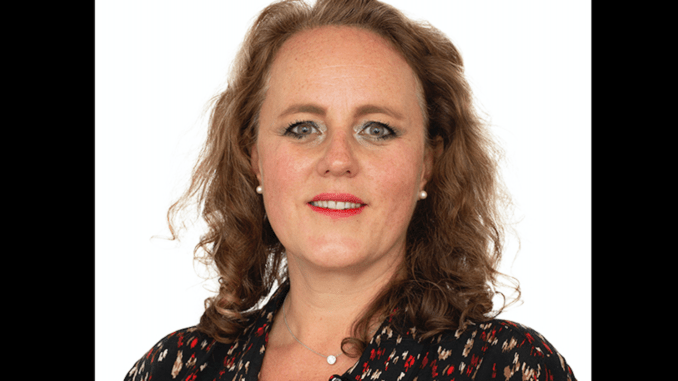
Law firms advising their clients on legal operations was until very recently a super-niche activity. Today, firms such as Norton Rose Fulbright (NRF) are now into their third year of providing such services and the team is growing. Artificial Lawyer spoke to Stephanie Hamon, Head of Legal Operations Consulting at the global firm, about her journey and this growing area.
Hamon first noted that when she moved over from Barclays to join the firm’s Transform team, which spans multiple areas, from tech to an ALSP-type capability, the expectation was that she’d be able to go straight into providing legal ops advice.
‘Three years ago there was a lack of knowledge [in the market], so we could not really do sales as we needed to educate the market and build the brand,’ she said.
The firm instead did a lot of outreach and roundtables to steadily generate interest. Now, things are moving forwards rapidly and there are around 10 people with a primarily consulting focus that can be brought into legal ops projects. In turn these work with the rest of Transform and the wider firm, to provide a mix of advice on change management, tech use and data use, as well as legal advice.
Transform, she added, is now around 300 people in total that can be drawn upon, with about 50 staff in their Newcastle hub, with both paralegals and associates working on projects, which could range from a big LIBOR repapering effort for a client, to specific tech advice, to Hamon’s main area: legal ops consulting.
One could see this in some ways as an effort to build a competitor to what the Big Four are offering. Although, those at law firms might say that it’s the other way around.
It’s also good to see that they don’t charge by the hour for their services. ‘We practise what we preach,’ Hamon said.
They scope work out, provide a timeline, build a team and get to work.
‘There is predictability and we run matters very efficiently,’ she added.
It’s A State of Mind
But what is legal ops? We use the term so much these days it’s sometimes hard to be sure what everyone means by it. Hamon is well aware of this.
‘If you ask 10 people what legal ops is, you will get 10 different answers,’ she noted.
She added that some people will focus on just one aspect of what happens inside a legal team, e.g. billing and metrics around those numbers, others will see it as a super-broad subject covering multiple things.
Hamon is in the latter camp.
‘Legal ops is an ethos for transforming things, to change the [legal] industry,’ she explained, ‘it’s more a mindset than a role.’
She added that, ironically for a philosophy that is focused on operational matters, it’s all about being strategic and about showing that the legal department is not just a cost centre, but can create value for the business. However, she noted that not every legal team can do this work even if they want to, as they just don’t have enough staff.
That said, the desire to change things is seen across the field, Hamon noted.
‘We work with companies with 12 people to hundreds of people [in the legal function] but they all have similar challenges.
‘What is the same is the drive from the leadership to be a modern legal function, and that has given us insights into the market,’ she added.
In short, as she said, legal ops is a state of mind, it’s about wanting change and then looking for ways to make that change real.
Sometimes that change will have a tech focus, e.g. CLM, although that in itself is just part of a bigger picture around contract management, standardisation, improving efficiency and helping lawyers focus on more valuable matters – as well as helping the wider business leverage data in contracts. And that’s just one aspect of what legal ops might get involved with. Other times it may have no tech component.
As noted above, Hamon underlines that they could do a piece of work for a client where legal design was a dominant feature. There is simply so much to do. And from what Artificial Lawyer has seen it’s fair to say that many inhouse teams are in effect ‘open territory’ for improvement beyond the specific legal support they provide.
But why the rush to change? There seem to be many reasons as far as this site can see, and many mirror the reasons for the changes in the legal advisory world, but one that Hamon picks up on is the evolving expectations for GCs.
‘GCs want to be a strategic business partner, and it can also be the case that the legal team is now more accountable and so they need new business management. That’s a new skill-set,’ she noted.
And the key word here is: business.
We often hear the phrase ‘inhouse teams that are really part of the business’, but it does now feel as if that is becoming true, rather than a statement of intent.
For example, CLM systems connect inhouse teams to the rest of the enterprise, meanwhile the other parts of the company are looking to legal to provide not just answers to legal queries, but to visibly help improve the business’s ability to operate, e.g. speeding contract approval, supporting self-serve legal needs, and providing data to other parts of the company such as sales (or conversely working better with sales on contracting needs).
And of course, there is the well-documented pressure on legal spend, although this site would finesse that point and add that there seems to be little real pressure on cutting costs for very high-risk work. Where the pressure is focused is on anything that an ALSP could do: high frequency, low-risk work, whether that is explicitly ‘legal work’ or work where legal and compliance teams end up having to get involved for regulatory reasons.
Last thing: where is this going? Is the idea to grow and grow the NRF legal ops team? Where does this get to?
‘We can see the clients have a need, so this is client-driven. But, this is also a defensive move for law firms against the Big Four. ALSPs are also moving up the value chain and it’s important how you [i.e. law firms] position yourself to be the partner of choice,’ she said.
That said, law firms have a very big ace up their sleeve – they remain the dominant place to go to for legal advice, and that is unlikely to change anytime soon (even with plenty of changes among the Big Four). That said, in a world where there are multiple providers at the high frequency, low-risk end of the legal demand pyramid, then law firms cannot be complacent – and this awareness is clearly what is driving much of the interest in legal ops and for providing ‘More than Law’ services.
Hamon also noted that there is a lot of room in the market for growth – for everyone. Her team has tripled its revenues and they are profitable, she added.
‘In 10 years this could be a significant revenue stream within NRF. Look at the Big Four, they started in consulting and then did legal. We are a mirror image of that!’
On that note, we shall leave it. Clearly there is much more to come and as law firms increasingly embrace ‘More than Law’ approaches, so too will the overall fabric of the legal market and client relationships develop. Meanwhile, Hamon and the Transform team at NRF will be right in the middle of this.
—
Legal Innovators UK Conference – London, November 10 + 11
If you found the topics covered in this article of interest then come along to the landmark two-day legal innovation conference in London. Day One: Law Firms and ALSPs, Day Two: Inhouse and Legal Ops. We have a fantastic line-up of speakers from across the legal and legal tech ecosystems for this event focused on learning, sharing and networking. See you there if you care about legal sector innovation!
Tickets and more information can be found here.
